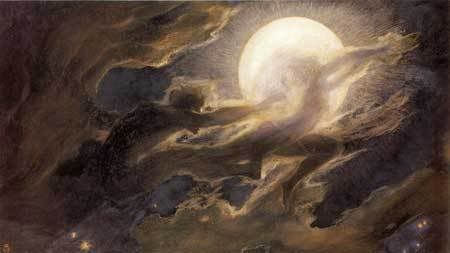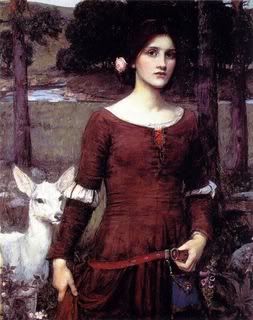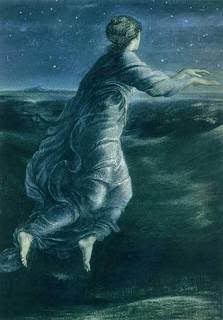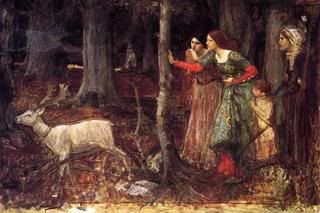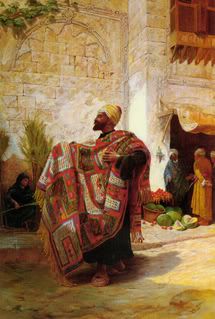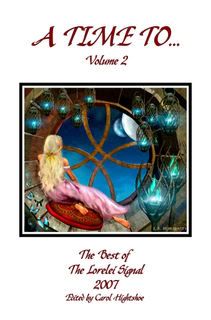Empress Regnant
by Maia Jacomus
“I still say that runt Padishah Sedha killed Emperor Anil.” Fadir had been saying the same thing for ten years, and always just after praying at the family’s home shrine.
“Yes, dear,” his wife, Lasani, droned, not looking away from her embroidery.
“The sages were probably in on it, too, I bet. Wanted their share.”
Lasani sighed and set her embroidery on her lap. “He died naturally, dear. There were no marks of any kind on him. Now, for the final time, let it be. Whatever the cause, there is nothing to be done about it now.”
A young woman drifted into the room, dark eyes downcast as she entered the shrine. Fadir closed the door for her, then instinctively looked to his wife, awaiting the beginning of another familiar argument.
“We are telling her today,” Lasani said resolutely, picking up her embroidery and focusing as if no more conversation would follow.
“No, not today.”
“As soon as she comes out of there, I am going to tell her.”
He bent down over her to meet her eyes and stress, “Not today.”
“She is twenty-six. It is past time she knew.”
* * * No matter how hard she tried, Kumari couldn’t pray. She would kneel down on the damask pillow and stare into the ruby eyes of the golden idol, trying desperately to explain to herself why it looked so familiar. In her mind, she pictured it three times as big and adorned with colorful silk. And the musk-scented incense, though fulfilling, was thicker and stronger than she thought it should be. She gazed into the idol’s darkly shining eyes until her parents’ argument reached its peak and snapped her from her meditation.
Emerging from the shrine, she halted as the two immediately fell silent and looked at her as though she were a lotus blossom dropping its petals.
“What?” she asked the two in wonder. Although that same look bombarded her every day, it still made her nervously twirl her long black hair between her fingers each time it loomed.
Fadir turned to Lasani, lifting his brow. She opened her mouth, but then clamped it shut and returned the brow raise. Finally, Kumari had had enough.
“For the past five years, you two have been doing that dance,” she said. “This time, please, end your silent duel and say what it is you are thinking; I have no patience anymore!”
Lasani reached for her embroidery, but Fadir swiped the cloth from her, his eyes stern.
“Kumari, dove...” she began. But she could not make the other words follow. As if to gather her courage, she rose from her seat and approached her daughter, taking her hands. “It is nothing important,” she finally said.
Fadir nodded, grinning warmly. “Nothing important.”
“It must be. You both have been mulling over it for years. And it obviously concerns me. What is it?”
Fadir opened his mouth to speak, but his wife interrupted.
“It is about the sari I have been embroidering,” Lasani said, unfurling the gold-colored fabric. “I have been embroidering it all these years. And...what it is...the problem, I mean...Every year, I mean to finish it, but I cannot manage to. Every year, I wonder about telling you that it is for you, you see...It was meant as a gift, a surprise...But it has taken more time to make than I anticipated. Even now, it has yet to be finished.”
Everyone in the household knew how sensitive Lasani was regarding her embroidery. Fadir and Kumari used to tease her about her meticulousness. They would always look over her shoulder as she worked and remark on her slow progress, snickering every time she pulled out a stitch with a fault that neither of them could see. There was no way Kumari could combat her mother’s declaration.
Kumari approached her mother and ran her fingers along the delicate, extravagant gold embroidery, tracing the petal of a flower bud. She smiled in admiration. “It is beautiful, mother. Your best work.”
“You will not chide me for working so slowly?”
“Of course not. The slow pace reaps the best possible quality. It is good that you so take pride in your work, mother.”
Lasani and Fadir exchanged cunning smiles, having eluded their daughter’s prying. And as Kumari left to prepare for bed, the couple decided never to bring up the subject again.
* * *“Into the stable!”
The unusual greeting jerked Kumari from sleep. Before her eyes could focus, her father gripped her wrist and pulled her out of bed.
“Am I allowed to change first?” she asked.
Fadir didn’t seem hear her, and she knew better than to question him. Stumbling out into a grey morning, she tried to keep up as her father led her to the stable and opened the gate to the cow’s stall.
“Get in,” he commanded.
She did so, approaching the cow. “Do you want me to milk her?”
“No, just sit down in the corner. Do not move, do not make any noise, not until I return.”
Before she could further rebut, he closed and locked the stable gate.
The musty odor of hay and the low moaning of the cattle surrounded Kumari as she sat in the far corner, trying to think of why her father was behaving so strangely. Unable to sort it out, she laid back on the hay and stared at the cracks of light piercing through the roof, trying to find which clusters resembled star constellations. There was one near the apex that reminded her of Ibis Flight.
* * *The starry Ibis hovered over her. It was her only comfort, her only protection in the empty, silent, trampled rice field she found herself in. The chilling wind hardened the mud which covered her sari and face. She was crying, but she couldn’t remember why. And upon seeing the unfamiliar surroundings, her fear mounted into sobs.
“Hello?” Her voice wavered with uncertainty.
She unstuck herself from the muddy ground and rose to her feet to look around for something--anything--familiar. But the darkness of the night dimmed her view. The only familiarity was that same Ibis above her.
“Help me!” she cried, shouting as loudly as she could in a desperate attempt to reach the ears of the heavenly bird. “Please help me!”
A light flared, small from the distance. She stopped crying and held her breath in anticipation of what the light would bring. She heard a shout, “Who is there?”
Trusting in this miracle from the Ibis, she opened her mouth to reply, only then realizing that she didn’t know her name. “Please help me!” was all she could manage before fear brought tears to her eyes again. She sat in the mud for what seemed like a small eternity; the cold numbering her skin, and the mud drying in heavy clusters on her limbs. At last, someone approached her and said in a kind, sympathetic voice,
“Oh, you poor dear!”* * *Kumari shook herself from the memory, suddenly rising.
“There’s one!”
Looking up, she saw a man peering over the stall gate. She rose and looked out to see, sitting on their lawn, a barred wagon full of young women. A handful of armed men stood near it, the royal symbol of a golden tiger on each of their tunics. The one who stood at the gate fumbled to unlock it. She climbed onto the cow’s back, then tried carefully not to step on the hem of her night robe as she slowly stood. The gate swung open, clanging against the stall fence. It was Kumari’s signal to jump from the cow and onto the fence. Before she could lose her balance, she leapt and caught hold of the rafter above. She could feel the soldier trying to grasp the hem of her night robe.
“Come down!” he ordered.
Feeling her grip slipping, she swung herself forward, grabbed the rope that opened the grain chute, and slid down, burning her hands along the way. The soldier who had left the stall to pursue her rushed toward her and slipped on the spilled grain.
After briefly trying to shake off the pain of her burnt hands, she ran to the bull’s pen, unlatched the gate, and slapped him on his back. The bull bleated loudly and bolted off into the mass of soldiers, his long, curved horns ahead of him. While the other soldiers scattered, the one who had slipped got back on his feet and threw his arms around her. She shouted and cried, she kicked furiously, but another soldier came to help detain her as the two dragged her to the wagon. The commotion summoned Lasani and Fadir from the house, and the two dashed into the mass of soldiers. Lasani begged with them to release their daughter, and Fadir tried tearing them away, but the other soldiers kept them at bay, having managed to slay the raging bull.
Forced into the wagon and locked inside, Kumari stared out one of the barred windows, reaching her hand out toward her parents. They tried to take it, but the wagon began to wheel away, the soldiers following on their horses. Kumari watched, vision blurry with tears, as the wagon took her from her home. The last thing she saw before she was pulled far from the sight was the once-mighty bull, lying dead on the ground with its glossy black eyes staring back at her.
* * * Once her sobs calmed, Kumari spoke with some of the other women to learn what she could of the situation. Her hunches were correct: they were being harvested for Padishah Sedha. Since the emperor’s death, and the disappearance of his heir, the only one worthy to rule was Padishah Sedha, the then-young cousin of the emperor. The people of Rudjosai all knew full well about his ambitions to conquer the neighboring realm, Ghadhala, and everyone feared going to war. Fortunately for them, a law existed which dictated that when the royal blood line was exhausted and a new one took over, the first new member of the royal family must be constantly advised by a council of sages, and nothing could be done without their approval. The harvesting of young women was one of the few allowances he had in which the sages had no say, so naturally he employed it whenever possible. Despite how badly her burnt hands stung, she felt somewhat grateful for the scars; having such a physical flaw could save her from being chosen.
Once they arrived at the palace, they were herded inside to a small chamberBa servant’s quarters with only two chairs for thirty women. Some of them talked excitedly about possibly being with a Padishah. Others, like Kumari, stared at the dim torches and the stone walls, praying to every god they knew that they would be home again by the end of the day. They were shut inside the room for three hours until finally the door opened and a soldier instructed them to line up in the hallway. Kumari leaned back against the wall with her head bowed, trying to become invisible.
“His Imperial Highness, Padishah Sedha,” the soldier announced.
There he stood, at the end of the hallway, a magnificent figure: he was bare-chested, wearing a long jacket and pants, both of rich, purple silk and embroidered with gold. His red velvet shoes had soles of real gold, which emitted a commanding, bone-shivering clank as he walked. His long black hair was braided back with a golden ribbon, and though he was fiercely handsome, his dark eyes flared like black flames. Kumari stared at him in fascination until the clank of his shoes twitched her head back down to stare at her bare feet.
Clang. “Too old.” Though his voice was low, it was clear as two swords striking each other.
Clang. “Too plain.”
Clang. “This one is pregnant, you idiot!”
Clang.Kumari’s heart pounded harder and faster as she heard him approach. She bit her lip and winced at every clank of his shoes.
“Too young.”
Clang. “The eyes are too close together.”
Clang! A shadow fell across her feet. Kumari couldn’t move. A hand covered with rings lifted her chin. She stared into Sedha’s eyes, and the Padishah stared back. After a moment, his glance traveled up her face and rested on the mole above her right eyebrow.
“This one,” he said. “Send the rest away.”
A soldier ushered Kumari to another room on the second floor; one of the royal bedchambers, so filled with plush cushions and flamboyant silk drapery that it was like the inside a cloud set in a twilight sky. Three female attendants worked to dress her, groom her, and paint her face. By the time she looked in the glass, she could hardly recognize herself; dressed in a deep red sari with golden sandals, dripping with gold necklaces and jeweled rings. A ruby pin held up her finely-combed hair, kohl outlined her eyes, and her face glowed with blush and carmine lip color. She felt so weighed down by fabric and jewelry that she could sink into the ground. A doctor then entered to spread salve on her hands and wrap them in soft, white linen. No sooner was she made ready than Sedha came into the room, all five of the sages in tow. Seeing her, he smiled triumphantly.
“Just as I thought.” He approached her and took her hand. Something about his touch made her jump. He then turned to the sages and declared, “Behold: Princess Nadi, daughter of former emperor Anil, and heir to the Rudjosai Empire.” Then, turning back to her, he added, “And my betrothed.”
Kumari dropped his hand and backed away in alarm. The sages crowded around her, examining her face, many of them pointing out the definitive mole above her eyebrow and also stating the resemblance of the nose and the posture. They smiled and remarked how happy they were to see her alive and well, how much she had grown, how they had worried about her.
“Stop! Please, stop!” she cried. Though she had always had difficulty remembering her childhood, she had no suspicion of having ever been royalty.
“Where have you been, Your Highness?” one sage asked. “Were you abducted? By whom?”
“No, I...”
“Were you in hiding from your father’s assassin?”
“No.”
“Did you run away?”
“Stop! No, I am not who you think I am! I come from Rishti Village. My father is a cattle farmer.”
The sages murmured among themselves. “That settles it,” one concluded. “Loss of memory.”
“Maybe even hypnosis,” suggested another.
Sedha looked at her with a furrowed brow. “Do you not know yourself? Do you not know me?”
She was afraid to answer at first, but something in his eyes calmed her. “I know I am a farmer’s daughter, and that you are the Padishah.”
He shook his head. “When you were born, your parents and my parents agreed that we
would marry once we became of age. You were Princess Nadi then. And whatever you have been these past ten years, you are Princess Nadi once again.”
Kumari’s eyes passed from one person to the next until she sank onto her round bed.
“But it cannot be,” she whispered. “How can that be? How—when I cannot remember anything of it at all, when nothing looks familiar?”
His voice calm, Sedha offered his hand to her again. “Come with me. Do not be afraid.”
Hesitantly, she accepted his hand and let him lead her out of the room. A few doors away, the hallway opened up into a larger hall where generations of family portraits were carved into a large fresco. The family line was traced through a forest with leaping tigers separating one generation from another. At the very end was a portrait of Emperor Anil, Empress Consort Pagni, and the Princess. Although the Princess was a child, Kumari had the chilling feeling that she was looking into a mirror. And, sure enough, the Princess had the same mole above her right eyebrow.
Above all, looking at the late emperor’s face, she felt a twinge of recognition.
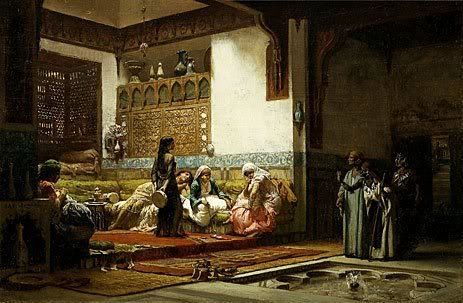
Kumari and Sedha were married that night. In spite of how everything still felt awkward to her, seeing that portrait convinced her that it was the life she was meant to have. Sedha behaved nothing like Fadir described: he was caring, attentive, and charming. And every time she was near him, she felt a rush of feeling that could not be denied.
For many days, she would go to the portrait fresco after the midday meal, sit across from the portrait of her family, and stare for hours into the eyes of her father, waiting for her past to catch up with her. And though no recollections surfaced, it gave her time to think. On the seventh day, she had an epiphany.
Of course, she thought.
I was kidnapped by Fadir; it makes absolute sense. For years, they always acted so strangely, as if they were hiding some secret. And they always spoke so badly of the Padishah, the one person alive who could identify me! Although it fit with her theory, she refused to believe that Fadir or Lasani could have assassinated Emperor Anil. At dinner that night, when Sedha asked his usual question about her progress in recovering her memories, she answered her usual reply, “Nothing yet,” for fear that mentioning her foster parents’ names would lead to them being punished.
* * *A week after their marriage, Kumari and Sedha had to endure the formality of a crowning ceremony. Since they were married, they were eligible for their full titles: Emperor Sedha and Empress Consort Nadi. In celebration of the Princess’s return, their marriage, and their crowning, the sages arranged for them to throw a large party, inviting all the nobility of Rudjosai to attend.
The party was hosted in the imperial gardens at night, among the orange trees, the plumeria blooms, and the crystal teal fountains. Sedha took her by the arm and introduced her to every guest, each exclaiming how good it was to see her again.
But no matter how much they seemed to know her, not one of them had a place in her memory. She separated from the party at her first opportunity, ran into another part of the garden, laid on a stone bench, and found Ibis Flight in the night sky.
She felt, just for a moment, that she was Kumari, a cattle farmer’s daughter, lying in the hay loft.
“I am sorry if you have been overwhelmed.”
Sitting up, she saw Sedha walking toward her, his soles like chimes singing against the stone pathway. He sat on the opposite end of the bench, allowing some distance between them.
“I have been anxious for you to remember everything, but perhaps I have been pushing you too hard,” he continued.
She nodded. “It is a lot to take in, but...I have been anxious, too. I thought of praying to the gods for help, but...” She chuckled slightly. “This palace is so large, that I have yet to find the shrine.”
For a moment, silence fell between them. They listened to the dull roar of the party guests and the faint musical hum of the drums and the stringed veena. In the midst of it, she dared to move closer to him and lean her head on his shoulder. He wrapped his arm around her. A tear fell down her cheek.
“I still cannot remember you,” she said. “Yet I do remember loving you.”
* * *Two days after the party, Kumari assumed her usual position in front of her family portrait. She was slowly beginning to remember her father--the way he smiled, the way he laughed, the way he scolded her--but nothing more. When her eyes became tired, she decided to wander the palace again, to explore undiscovered rooms. There was one room tucked away next to the library with a door displaying the image of a god. Finally, she had found the shrine. She opened the door and walked onto a floor tiled with ivory. The walls were covered with pure white tapestries. Sitting in the middle of the shrine was a stand on which the golden idol was displayed; three times larger than the one at her previous home, and adorned with colorful silk. She knelt down on the silk pillow, kissing the floor in reverence.
“Please forgive me,” she whispered. As soon as she had said it, she wondered why.
Slowly raising her head, she spied a gilded incense stand with an unlit stick, and her heart leapt in alarm at the sight of it. Fighting the inexplicable urge to leave, she breathed deeply to calm herself enough to begin prayer. She focused on the ruby gaze of the idol and opened her mouth to pray, when a flash across the jeweled eyes suddenly struck her, and she became engulfed in a memory.
“I cannot do it,” Princess Nadi said. She clutched a gilded incense stand in which Sedha had lodged an incense stick.
“He threatened to break the betrothal,” Sedha said. “If you do not do this, then we have no chance of happiness. The apothecary promised me that it will be entirely painless.”
Trembling and holding back tears, Nadi walked down the hall to the shrine and switched its incense with hers.
She sat up in her room, watching the sun from her window to determine the time. Mere minutes passed until she burst out of her bedchamber and ran down the stairs to the shrine. Opening the door, she found her father lying lifeless on the floor in a cloud of incense smoke. She cried out in anguish, collapsing to the floor in tears.* * *A number of soldiers immediately dashed through the halls, searching for the source of the loud cry. Turning the corner toward the shrine, they found Kumari on the ground, sobbing uncontrollably. They asked her what was wrong, but she couldn’t speak through the tears. Moments later, Sedha appeared. Seeing her kneeling down just outside the shrine, he immediately knew what was wrong. He helped her to her feet and hurried her away from the soldiers before she could speak. Sitting her down in a private study, he embraced her and spoke soothingly.
“It was for the best, Nadi,” he said. “We had no choice.”
“I killed him,” she gasped. “I remember everything now. After I put the sudaj incense in the shrine, I walked away, but I realized that I just could not allow it to happen. I tried to go back and retrieve the incense, but it was too late.” Nadi wiped her falling tears on her linen-wrapped hands. “I was so scared and ashamed that I just started running. When I got tired of running, I fell asleep. And when I woke, I found myself in a rice field and had forgotten everything. I killed him; I killed my father.”
“But we are together now, just as we wanted.”
“Yes; of course I wanted it. But not that way.”
* * *Lasani continued her embroidery in silence. Fadir sat in his chair in the corner of the room, rocking uneasily and staring at the fire. Just as his eyes began to burn from the fire's heat, he leapt to his feet.
“It has been too long,” he decided. “I have to go after her.”
“If you try, you will not even make it into the courtyard. I already lost a daughter; I do not want to also lose a husband.”
“I have to at least try! She was taken to Sedha; she could be in danger!”
“What makes you think ill the Padishah?”
“You mean besides the way he abducts our daughters for his own pleasure?” Trying to calm himself, he pulled his chair over near his wife and sat down. “There is something I have never told either of you, because I did not want to frighten you. Well...beyond the things I would already say.”
“About the Padishah?”
“I was herding a number of cattle to the city market. This was ten years ago. The Padisha was shopping with his guards as I was there. I was surprised to see the Padishah doing his own shopping, but did not think much of it at the time. He bought one of the cattle for beef, and ordered that I take it to the palace. And as I waited for someone to receive my knock at the back gate, someone else joined me in waiting.
“‘Delivery for the Padishah?’ I asked.
“‘Yes, in fact,’ he said.
“‘What is your trade?’ I asked. I was only trying to make friendly conversation.
“‘Apothecary,’ he said.
“‘Oh, interesting,’ I said, though I did not actually think it was interesting. ‘What are you delivering, then?’
“‘Incense,’ he said. I thought it was strange that an apothecary would sell incense.
“‘What kind?’ I asked. He did not say anything, just knocked on the door again. I thought he was getting irritated with my small talk, so I stopped.”
“I wish you would stop,” Lasani interrupted. “What does this have to do with anything?”
“As he knocked on the door, something fell out of his sleeve; a packet of incense sticks. And there was an ink emblem on the packet...”
* * *Since Nadi had recovered her memories and her self, the sages were no longer necessary as a council. They were merely advisors, and so Sedha and Nadi had regained full power. Sedha’s first action as full Emperor was to prepare the army to conquer Ghadhala. But Nadi rebutted him.
“Not only is this unnecessary,” she said, “but our people have no desire to go to war. To force them to do so would cost us their loyalty.”
Sedha shook his head. “I respect your feelings for our people, Nadi. But I think living as a farmer’s daughter for ten years has made you too attached to them. Think of how much stronger we will be when we expand our empire and rule it side-by-side.”
“Why wait for an expansion?” she asked. “Let us start now; ruling side-by-side. And let us start by discussing action besides war.”
“I want to give you the world,” he protested.
“The world is too costly, even for an emperor. Even if we win, we will still lose our people in the fight. If we lose, our entire kingdom will be lost. Be happy with what you have; I am.”
But he still would not back down. After days of debating the subject, Nadi decided to include the problem in her prayers as she made her daily visit to the shrine. Though it took some time to return to the scene of her sin, she was determined to meditate there every day and to pray for forgiveness for what she had done to her father.
While she prayed, she inhaled the soft, sweet scent of sandalwood and frangipani that burned from the incense stick. It smelled different--there was an extra scent that she couldn’t quite place. And the more she thought about it, the dizzier and foggier her mind became. The ruby eyes of the idol flashed, drawing her from the spell.
Now she recognized the smell.
She tried to stand, but her legs gave out beneath her. Falling to her stomach, she tried to crawl across the slick, ivory floor. In one desperate reach, she grasped the door handle and pulled it open. She laid across the threshold and tried to inhale the clean air. Her breath came sharply at first, then slowly began to ease.
Clang. Clang. Clang. Looking up from the ground, she saw Sedha kneeling before her. He lifted her chin, his eyes full of remorse. She reached up and grasped his hand, quirking a half-smile.
“You came back,” she said. “You could not go through with it.”
He kissed her and stroked her hair. “Yes, I came back.” Then he grabbed her by the arm, pulled her to her feet, thrust her back into the shrine, and held the door shut. “I knew you would escape,” he added.
Nadi flung herself at the door, but it wouldn’t budge. “Why are you doing this?”
“For the good of the empire, Nadi. You will not allow it to grow.”
Having no luck with the door, she turned around, tore the incense stick from its mount, and crushed it beneath her sandal. Still, the existing smoke that shrouded the room began to cloud her mind again. She continued talking, trying to stay concious. “That was all you ever wanted from the start; you wanted to kill...my father to assume power, and...you needed me to grant you full power. Now...that you have it, you can be rid...of me.”
“You must understand, Nadi, that I do love you, and always have.”
“But not enough!”
When Sedha opened the door, Nadi was motionless on the floor. He bent down and kissed her forehead, then slipped out of the room, sure that someone would find her by the time he woke the next morning.
* * *The morning sunlight streamed into the room as the servant drew the curtains open. The sudden light woke Sedha from his uneasy sleep. What he saw upon opening his eyes made him jump: his bed was surrounded by soldiers, all brandishing their scimitars.
“What are you doing?” he demanded.
The assembly parted, and Nadi approached his bed, dressed in a gold sari with golden embroidery. “Arrest him,” she ordered.
“I am your Emperor,” Sedha protested. “She is just a woman.”
“You are charged with the murder of Emperor Anil and attempted murder of the Empress.”
“
You murdered the emperor!”
“
You did! It was your doing! And I have the proof of it!”
“What proof?”
A handful of soldiers brought forth an elderly man wearing a plain tunic and apron.
“This man has confessed to selling sudaj incense to you,” Nadi said. “That same incense was in the shrine where the Emperor was found dead and where I was found unconscious.”
Their eyes pierced one another. Finally, Sedha presented his hands to be shackled by the nearest soldier, who immediately took him and the apothecary away. But before he was out of sight, Nadi added, “And this is for the good of the kingdomBall for the best.”
“Is he to be executed?” one of the soldiers asked as Sedha was being taken away.
“He will serve a life sentence, in a dungeon cell,” Nadi replied. “I have no desire to be a murderer.”
The hall cleared as the guards escorted the prisoners along. Nadi was left alone until she beckoned to two people who had been hidden in the room next door; Fadir and Lasani. The three embraced each other with all their collective strength.
“I knew I could trust you,” Nadi said. “I knew the second I returned home.”
“When you walked through the door,” Lasani began, “dressed as you were, I thought I would faint!”
“I hardly recognized you with all that paint on your face,” Fadir added.
“Thank you both so much,” Nadi said. “And thank you for the sari; it was worth the wait.”
“You wear it so well, dove.”
Nadi smiled, feeling truly at home in the palace at last. “I want you both to stay here with me. You took me in and gave me a home, and now, I wish to do the same for you.”
The couple looked around at their grand surroundings with uncertainty. “You are the Empress now,” Lasani said. “We do not fit together anymore.”
“I am still Kumari,” Nadi said. “I was then, I am now, and I will always be. And I would still like to be a part of your family.”
The couple had no reply but to once again embrace their foster daughter.
* * *Once again, Nadi sat across from her family portrait. She looked on the mother she never knew, the father she had murdered, and her child self she had once forgotten.
A new portrait had been carved on the wall next to her family; it was of a young woman, and no one else: a young woman with the red mark of marriage on her forehead, with her father’s seal ring on her healed hands, with her mother’s bold, beautiful eyes, and with a golden sari. The portrait was captioned by a gold engraving below:
Empress Regnant Nadi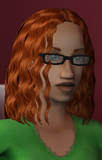 Maia Jacomus
Maia Jacomus is 23 years old, and recently graduated with a BFA in English (Professional Writing emphasis). She enjoys writing poetry, short stories, novellas, novels and plays. Some of her favorite authors are Jane Austen, Sir Arthur Conan Doyle, Gail Carson Levine, Tamora Pierce, and William Shakespeare. Aside from reading and writing, her hobbies include painting, playing Nintendo and World of Warcraft, and theatre.
Where do you get the ideas for your stories? Ideas for my stories come from everywhere, and most of the time, when I’m not looking for them. My inspiration for “Empress Regnant,” for example, came from watching the smoke rise from my incense burner. Sometimes, I also like to listen to instrumental music and conjure a story from the mood and rhythm of the music.







